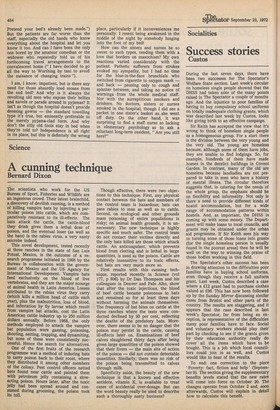Socialities
Success stories Custos
During the last seven days, there have been two successes for The Spectator's Welfare State section. Last week's circular on homeless single people showed that the DHSS had taken note of the many points raised in The Spectator a couple of months ago. And the injustice to poor families of having to buy compulsory school uniforms on totally inadequate clothing grants, which was described last week by Custos, looks like giving birth to an effective campaign.
Sir Keith has accepted the view that it's wrong to think of homeless single people as a homogeneous group. For a start there is the division between the very young and the very old. The young are homeless because, although some of them have jobs, they are unable to find lodgings. So, for example, hundreds of them have made homes in the derelict buildings in Covent Garden. In contrast, many of the old are homeless because landladies are not prepared to take in men who have a history of mental illness. The circular therefore suggests that, in catering for the needs of the whole group, the emphasis should be on flexibility and informality. Not only is there a need to provide different kinds of hostel accommodation, but for a wide range of accommodation patterns within hostels. And, as important, the DHSS is coming up with some money. The Department will make loans to local councils, and grants may be obtained under the urban aid programme. If Sir Keith sees Iris way to turning some of those loans into grants (for the single homeless person is usually found in the poorest areas) then he will be well on the way to winning the praise of those bodies working in this field.
The Spectator's other success has been in drawing attention to the difficulties poor families have in buying school uniforms, even though they receive a full uniform grant. Last week, Custos described a case where a £12 grant had to purchase clothes valued at £36. This has now been followed up by the Sunday Mirror discussing similar cases from Bristol and other parts of the country. The results are staggering, and it appears that the case described in last week's Spectator, far from being an exception, is representative of the difficulties many poor families have to face. Social and voluntary workers should play their part by checking to see if the grants given by their education authority really do cover ' all the items which have to be bought. This is a job which local councillors could join in as well, and Custos would like to hear of the results.
To end: one correction to the piece ' Poverty: fact, fiction and help' (September 9). The section giving the supplementary benefits levels stated that the new rates will come into force on October 20. The changes operate from October 2 and, soon afterwards, Custos will explain in detail how to calculate this benefit.


































 Previous page
Previous page